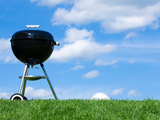How to Have a Healthy Summer BBQ
It’s no surprise that foodborne illnesses increase during the summer months. To make sure you and your friends are eating safely at the next summer cookout, follow these tips:
· Cool It: To prevent foodborne bacteria from paying a visit to your picnic, keep food as cold as possible during transport—40 degrees or colder. A full cooler stays colder longer than a partially filled one, so pack food straight from the fridge and pour on ice to the brim.
· Marinate Smarter: Marinate meat and fish in the fridge, not at room temperature. Also, never use marinade that’s touched raw meat or fish as a sauce for cooked food.
· Keep Everything Clean: Be sure there are plenty of clean utensils and platters. To prevent foodborne illness, don't use the same platter and utensils for raw and cooked meat and poultry. Harmful bacteria present in raw meat and poultry and their juices can contaminate safely cooked food.
· Safe Minimum Cooking Temps: Cook meat fully to kill common foodborne bacteria like salmonella, listeria, and E. coli. Using a food thermometer, ensure that all raw beef, pork, lamb and veal steaks, chops, and roasts are cooked to a minimum internal temperature of 145 °F, all raw ground beef, pork, lamb, and veal to 160 °F, and all poultry to 165 °F . NEVER partially grill meat or poultry and finish cooking later. When reheating fully cooked meats like hot dogs, grill to 165 °F or until steaming hot.
· Leftovers: Refrigerate any leftovers promptly in shallow containers. Discard any food left out more than 2 hours (1 hour if temperatures are above 90 °F).
Visit these websites for more information:
http://foodsafety.gov/
http://www.fsis.usda.gov/fact_sheets/Barbecue_Food_Safety/index.asp
Posted: June 28, 2012, 4:37 PM
